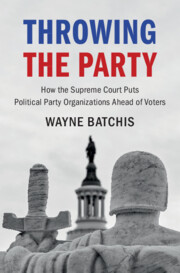Book contents
- Throwing the Party
- Cambridge Studies on Civil Rights and Civil Liberties
- Throwing the Party
- Copyright page
- Contents
- Preface
- Acknowledgments
- Part I Foundations
- Part II Party Primaries
- 4 Setting the Stage
- 5 Primaries and the Party in the Electorate
- 6 Double Standards
- 7 Doubling Down on the Party Organization in Service of the Major Parties
- Part III The Party, the Court, and Campaign Finance Law
- Part IV Passé Equal Protection and a Way Forward
- Index
5 - Primaries and the Party in the Electorate
The Right to Vote
from Part II - Party Primaries
Published online by Cambridge University Press: 16 June 2022
- Throwing the Party
- Cambridge Studies on Civil Rights and Civil Liberties
- Throwing the Party
- Copyright page
- Contents
- Preface
- Acknowledgments
- Part I Foundations
- Part II Party Primaries
- 4 Setting the Stage
- 5 Primaries and the Party in the Electorate
- 6 Double Standards
- 7 Doubling Down on the Party Organization in Service of the Major Parties
- Part III The Party, the Court, and Campaign Finance Law
- Part IV Passé Equal Protection and a Way Forward
- Index
Summary
The U.S. Constitution does not guarantee an individual’s right to vote. Instead, in keeping with the core approach the Framers took in the Bill of Rights, the Constitution speaks of voting only as a negative right. The right to vote “shall not be denied or abridged … on account of race, color, or previous condition of servitude”1 under the Fifteenth Amendment, nor “on account of sex”2 according to the Nineteenth Amendment, nor “by reason of failure to pay any poll tax”3 in compliance with the Twenty-Fourth Amendment, nor “on account of age” among citizens who are eighteen or older4 under the Twenty-Sixth Amendment. The Fourteenth Amendment, likewise, withdraws a state’s power to “deny to any person within its jurisdiction the equal protection of the laws”5 a constitutional restraint on government that prevents certain deprivations of the vote. When addressing voting inequality, the Court has suggested that “No right is more precious in a free country than that of having a voice in the election of those who make the laws under which, as good citizens, we must live.”6 To what extent and under what circumstances does, or from a normative perspective, should, the Constitution prevent the denial of voting rights in party primaries?
- Type
- Chapter
- Information
- Throwing the PartyHow the Supreme Court Puts Political Party Organizations Ahead of Voters, pp. 80 - 98Publisher: Cambridge University PressPrint publication year: 2022



